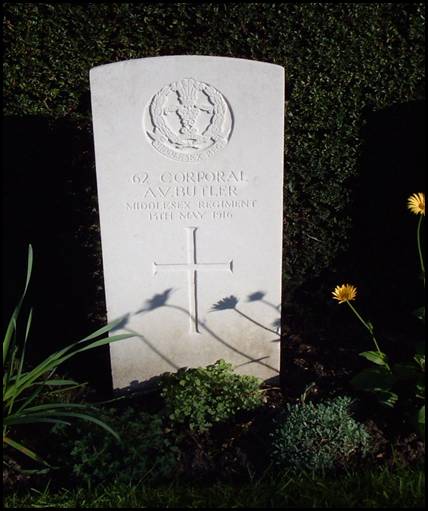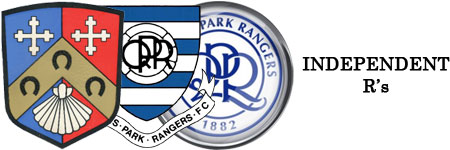Gordon Macey refers to a ‘J. Butler’ who made his debut for the R’s against Arsenal on Boxing Day, 1916 and went on to make 7 appearances. Dennis Signy had previously mentioned a player named ‘Butler’ in his book as ‘being a victim of the Great War’.
Colin Woodley recently lent me a copy of, ‘When the Whistle Blows’ by Andrew Riddoch & John Kemp in which they tell the story of the Footballers’ Battalion in the Great War. I was interested to read that Corporal Albert ‘Ben’ Butler of Queen’s Park Rangers Is referred to as being the first professional footballer in the ranks of the 17th Middlesex to be killed in action in the Great War. It made me wonder if John Butler had also served in the Footballers’ Battalion and if so, did he survive the War ?
It really is an outstanding book and one which I would recommend most highly. I contacted Andrew Riddoch and he kindly gave me permission to use the following section from his book. It also includes a picture of Ben Butler which I understand is copyright. However, he did send me a photo that he had taken of Ben Butler’s grave which is shown below:
‘On the evening of 30 April the 17th Middlesex moved back into the front line. Over the next few days six men were wounded, including Cpl Alf Gregson of Grimsby Town and Cpl Ben Butler of Queen’s Park Rangers. Ten days later, Cpl Butler died of his wounds. Rev. Samuel Green, a chaplain of Casualty Clearing Station No.22, recorded his impressions of the rugged centre-half:
A great, big chap lies in this bed – a guard bulges up the blankets over his leg. ‘Well, Corporal, how are you now ?’ – ‘Bad. This leg is done in. No more football for me. I’m a ‘pro’ and play for…..’
I look at the papers and see his thigh is shattered – always dangerous, these wounds. However the danger is not immediate, and I shall have many more half-hours at this bedside. He fights for dear life for ten days, and then goes out. He has played the game. I doubt not that he has won. A fine fellow – may he rest in peace.’
Corporal Ben Butler was the professional footballer in the ranks of the 17th Middlesex to give his life for his country. Before signing for Reading, Butler had been an engine cleaner for South-East Railway Company. During the 1909/10 season, in which Reading were relegated from the Southern League First Division, Butler had made 17 appearances for the club. The following season, when Reading won the Second Division Championship, the centre-half had played ‘the game of his career’ in a vital 2-0 victory over Croydon Common, before moving to Queen’s Park Rangers. Butler left a widow and two young children at the family home in West Hampstead.

These other servicemen had at some time played for the R’s and also lost their lives serving their country:
Albert Bonass: He joined QPR in 1938 and later became a reserve policeman before joining the RAF. Apparently he was something of a Ju-jitsu expert and between 1940 and 1945 he guested for Fulham, Aldershot, Brentford, Watford, Luton, Southampton and York. He was killed in August 1945 when his Stirling bomber crashed on a training flight.
Charlie Clark: He played in six league games for the R’s from 1936 to 1938 and was a Luton Town player at the time of his death in March 1943.
Alan Fowler: Guested a few times for the R’s in 1940/41 and 1943/44, but was actually on Swindon’s books although they did not compete between1940-45. He lost his life in August 1944.
Evelyn Henry Lintott: He was our first full England international of course who made 35 appearances for Rangers and was later killed leading his men of the 15th West Yorkshire Regiment on the first day of the Battle of the Somme. He was the first professional footballer to receive a commission. There is a brief mention of him in ‘When the Whistle Blows’ when it is revealed that only a few months before his death, when the battalion had been stationed in Egypt, Lintott had written home saying that ‘he was ashamed to put ‘On Active Service’ on the envelope as he had so little to do’. It also states that there was much speculation that he was to be transferred to the 17th Middlesex, but the move never happened.
Frank Cannon: Made 29 appearances in the Hoops before signing for West Ham. He was killed on the Western Front on 15th February 1916 and was buried in Potijze in Belgium.
Joseph Dines: Apart from winning more than 20 amateur caps for England, he also played in all three matches in the 1912 Olympics in Stockholm for the Great Britain team which won him a gold medal. He only made one appearance for the R’s and was one of three brothers to enlist, but only survived eleven days. He was cut down by machine gun fire on 27th September 1918.
Albert Edwards: He made 17 appearances for QPR and also played for Bristol City and Newport County. He lost his life in the Great War.
Oscar Horace Stanley Linkson: The book mentions this former Manchester United right-back player who was actually arrested on one occasion after absented himself with (Pte Wilfred Nixon of Fulham) to play for the R’s at White Hart Lane. Pte Linkson was killed on 8th August 1916 and is commemorated at the Thiepval Memorial. His mother never accepted that her son was dead. She chose to believe that he had run away to escape what she believed to be an unhappy marriage. He left behind a widow and two young children at the family home in Barnet.
John H. Pennifer: Arrived at QPR in 1913 and after just 3 appearances, he enlisted the following year. He played a number of times for the 17th Middlesex. There is some new information on him in ‘When the Whistle Blows’, when it’s recorded that: ‘Three days later, a 17th Middlesex team played Hampstead Town at the Avenue Ground in Cricklewood Lane, winning 3-1, Pte Henry Pennifer of QPR scored two of the battalion’s goals…’He died at the Battle of the Somme.
John Tosswill: Made 3 appearances for the R’s before joining the Royal Engineers. He became a dispatch rider and returned home after being wounded, but died on the operating table in 1915.
Harry Vernon Thornton: 37 Rangers appearances and scored 10 goals. Like many other players, he joined the ‘Footballer’s Battalion’ and later died in France.
Apart from the servicemen associated with playing for QPR and tragically lost their lives serving their Country, there must of been numerous R’s fans too. Sadly, there were two who were killed last year in Afghanistan:
Lance Corporal Tom Keogh: He came from the Hallfield Estate in Paddington and was only 24 when he died from a gunshot wound while fighting in Sangin, Helmand Province.
Acting Corporal David Barnsdale: 33 Engineer Regiment (Explosive Ordnance Disposal). He was killed clearing explosive devices and was also the same age. His parents laid a wreath in the Loftus Road centre circle before the Burnley home game in 2010.
WE WILL REMEMBER THEM
Steve Russell
(Once again, may I thank Andrew Riddoch for allowing me to reproduce some of the above text and also for the use of the pic. The other sources of reference include Reg Hayter’s 1948 history of the club, Dennis Signy’s 1969 book, John Marks’s, ‘Heroes In Hoops’, Kenneth Westerberg and Gordon Macey of course)

To add to Steve’s comments above I think everyone should take the time to read the book mentioned. It graphically brings home the supreme sacrifices paid by these volunteers and the horrendous conditions they faced every day.It puts to shame the antics of some of the modern day footballers.
Yes…WE WILL REMEMBER THEM
PS. I am not sure if Steve will be providing more info on the Footballers Batallion but they were much closer to the Rs than detailed above!
A very appropriate article for this day.
An excellent piece Steve. Thanks for writing it. Fortunately a great many survived – some lived a long life, like Danny Boxsall, winner of the Military Medal who died at the age of 89 http://www.indyrs.co.uk/?p=755 and others eventually succumbed to the mental pressures of service at a relatively early age – like Reg Allen http://www.indyrs.co.uk/?p=34.
The important fact is that we remember all of them.
A very poignant piece Steve.
There is a terrific film clip of the Clapton Orient team playing their last match before the bulk of the squad joined the Footballers Battalion in 1915 here: http://www.youtube.com/watch?v=l-kAjhlrtSE&feature=related
It’s hard to find but this book, although focused on Orient, is beautifully researched and is another fascinating read for anyone interested in the subject:
http://www.amazon.co.uk/They-Took-Lead-Contribution-Footballers/dp/B0039A3ZIC/ref=sr_1_1?ie=UTF8&qid=1321106654&sr=8-1